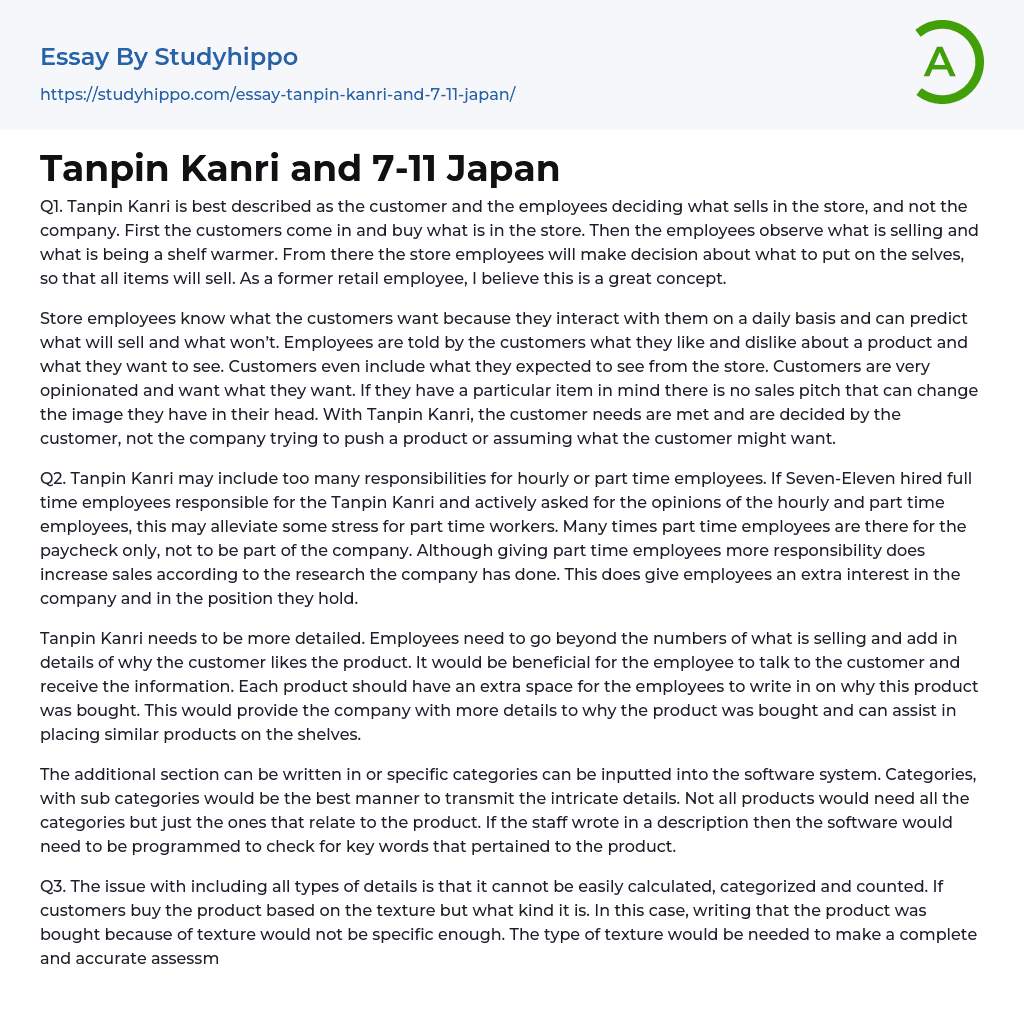Q1. Tanpin Kanri is best described as the customer and the employees deciding what sells in the store, and not the company. First the customers come in and buy what is in the store. Then the employees observe what is selling and what is being a shelf warmer. From there the store employees will make decision about what to put on the selves, so that all items will sell. As a former retail employee, I believe this is a great concept.
Store employees know what the customers want because they interact with them on a daily basis and can predict what will sell and what won’t. Employees are told by the customers what they like and dislike about a product and what they want to see. Customers even include what they expected to see from the store. Custo
...mers are very opinionated and want what they want. If they have a particular item in mind there is no sales pitch that can change the image they have in their head. With Tanpin Kanri, the customer needs are met and are decided by the customer, not the company trying to push a product or assuming what the customer might want.
Q2. Tanpin Kanri may include too many responsibilities for hourly or part time employees. If Seven-Eleven hired full time employees responsible for the Tanpin Kanri and actively asked for the opinions of the hourly and part time employees, this may alleviate some stress for part time workers. Many times part time employees are there for the paycheck only, not to be part of the company. Although giving part time employees more responsibility does increas
sales according to the research the company has done. This does give employees an extra interest in the company and in the position they hold.
Tanpin Kanri needs to be more detailed. Employees need to go beyond the numbers of what is selling and add in details of why the customer likes the product. It would be beneficial for the employee to talk to the customer and receive the information. Each product should have an extra space for the employees to write in on why this product was bought. This would provide the company with more details to why the product was bought and can assist in placing similar products on the shelves.
The additional section can be written in or specific categories can be inputted into the software system. Categories, with sub categories would be the best manner to transmit the intricate details. Not all products would need all the categories but just the ones that relate to the product. If the staff wrote in a description then the software would need to be programmed to check for key words that pertained to the product.
Q3. The issue with including all types of details is that it cannot be easily calculated, categorized and counted. If customers buy the product based on the texture but what kind it is. In this case, writing that the product was bought because of texture would not be specific enough. The type of texture would be needed to make a complete and accurate assessment. There are many different types of textures and to make the customer happy it has to be this special one. An issue that
will arise is to see if the details are important to the entire client base or is it just one customer. How many details should be included in the additional section? This will be up to the employee to decide what is worth sharing and what can just be a side note. Details add more to any system but are hard to organize and can be problematic.
Tanpin Kanri is a good concept because it makes the company invest in their employees. This allows for high retention rates which allows for the POS work to the full potential of the company. If the employees stay then they will develop a level of knowledge for the system and the store that cannot be learned in a training session. An advanced POS cannot replace the knowledge of the input that the employees have to work the system or how to use it to the best advantage of the company.
- Customer essays
- Customer Satisfaction essays
- Customer Service essays
- Target Market essays
- Bangladesh essays
- China essays
- Hong Kong essays
- India essays
- Japan essays
- Kuala Lumpur essays
- Malaysia essays
- Manila essays
- Pakistan essays
- Philippines essays
- Singapore essays
- Vietnam essays
- Vietnamese essays
- Advertisement essays
- Advertising essays
- Anheuser-busch essays
- Audience Theory essays
- Brand essays
- Brands essays
- Competitor Analysis essays
- Consumer essays
- Detergent essays
- Marketing Management essays
- Marketing Mix essays
- Marketing Plan essays
- Marketing Research essays
- Marketing Strategy essays
- New Product Development essays
- Point Of Sale essays
- Price essays
- Procurement essays
- Product essays
- Product Differentiation essays
- Product Placement essays
- Promotion essays
- Promotion And Marketing Communications essays
- Research Design essays
- Retailing essays
- Trademark essays




